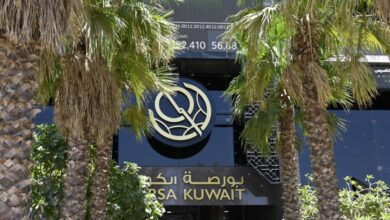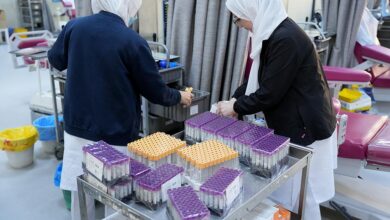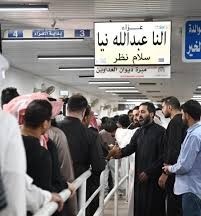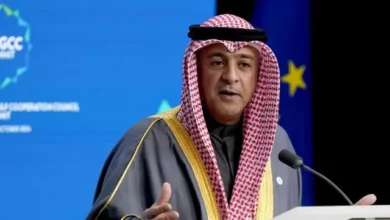“Kuwait Trade Minister” to address labor recruitment concerns to First Deputy Prime Minister
Khalifa Al-Ajeel, Kuwait's Trade Minister emphasized economic reforms and improving business ties with Egypt, while addressing labor recruitment challenges. Egyptian officials and company representatives discussed boosting trade, investment, and industrial cooperation between the two nations.
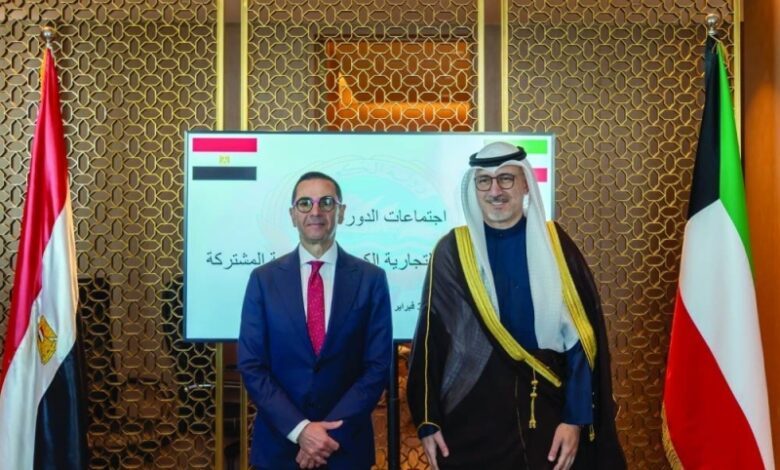
-
Kuwaiti Trade Minister Al-Ajeel emphasized that the country values Egypt as a strategic partner and aims to strengthen ties.
-
Kuwait sees a rise in service efficiency, with a focus on action over diplomatic promises.
-
Egyptian Minister Hassan Al-Khatib: Driving new economic partnerships and investment opportunities in industrial sectors.
The Minister of Trade and Industry, Khalifa Abdullah Al-Ajeel, emphasized the significant improvement in the quality and efficiency of services provided by the relevant departments. He highlighted the government’s commitment to closely monitoring investor feedback and continuously working to enhance the business environment, making it more attractive and conducive to growth.
Speaking at the opening session of the first Kuwaiti-Egyptian Joint Ministerial Trade Committee, held in Kuwait at the ministerial level, Al-Ajeel emphasized the importance of aligning work plans with tangible achievements, in line with the directives of His Highness the Amir. He highlighted that the approval of the general state budget at the beginning of the current month marks a historic milestone for Kuwait, demonstrating the government’s commitment to action over mere diplomatic assurances.
Al-Ajeel stressed that the government is dedicated to thorough research, scrutiny, and discussion of any received feedback, ensuring that necessary measures are implemented on the ground within the established legal frameworks.
Remarks of Egyptian Delegation
Addressing the concerns raised by the Egyptian delegation and Egyptian companies operating in Kuwait regarding manpower and the recruitment of skilled labor to meet project demands, Al-Ajeel assured that he would personally convey the matter to First Deputy Prime Minister, Sheikh Fahd Al-Yousef. He emphasized that the issue would be given due attention, particularly as it directly impacts businesses operating within Kuwait.
Speaking on the topic of taxation, Al-Ajeel stated that Kuwait has introduced a tax on multinational companies with revenues of 750 million euros or more, marking the establishment of the country’s first-ever tax system, effective from January 1, 2025. He clarified that ordinary companies will not be subject to this tax but will remain governed by other regulatory frameworks.
Regarding infrastructure project services, Al-Ajeel highlighted the numerous government projects underway and mentioned discussions surrounding the Arab Contractors Company, which has successfully executed several key projects in Kuwait in recent years.
Al-Ajeel also emphasized the recent amendments to the Public Tenders Law, which aim to make the process more efficient and positive. He reiterated the government’s commitment to creating the right environment for business, ensuring that obstacles and challenges preventing the smooth development of the business landscape are effectively addressed.
Moreover, Al-Ajeel stated that Kuwait views Egypt as a pivotal strategic partner, and is dedicated to strengthening this partnership, building on the achievements that are already made, and exploring new opportunities for cooperation between both the nations.
New Partnerships
For his part, the Egyptian Minister of Investment and Foreign Trade, Hassan Al-Khatib, emphasized that the relations between Egypt and Kuwait are exceptional, built on a foundation of deep understanding and mutual respect. He expressed appreciation for the political leadership and the people of Kuwait, wishing continued success and prosperity to Kuwait’s leadership and citizens.
Furthermore, Al-Khatib noted that the Egyptian delegation’s participation in the meeting aims to activate the trade and industrial cooperation agreement signed between Egypt and Kuwait in 2014. He highlighted that the goal is to foster continuous communication between the two nations; increase trade exchanges, and establish new economic partnerships through investment projects.
Al-Khatib emphasized that the Egyptian government has recently implemented a series of legislative and procedural reforms to enhance the overall investment climate, with a particular focus on industrial investment. These reforms include the Investment Law, which streamlines the process for granting licenses to industrial establishments.
Importantly, Al-Khatib highlighted the numerous industrial investment opportunities across various sectors, which are expected to boost trade and investment flows between Egypt and its brotherly countries. He expressed a strong desire to intensify efforts and develop initiatives aimed at further strengthening bilateral relations, particularly in the economic sector.
Al-Khatib expressed hope that the ongoing efforts from both sides will continue to foster the highest level of integration, benefiting both countries and strengthening their mutual interests.
“Arab Contractors”
The Regional Director of the Gulf at the Arab Contractors Company, Eng. Hossam Fayed, highlighted that the company’s presence in Kuwait dates back to the early 1960s. He emphasized that “Arab Contractors” is a government company that operates through tenders and boasts significant expertise in the field. Fayed also noted the company’s notable contributions to several successful projects in Kuwait, including the Jaber Hospital, Jahra Road Project, and Al-Nuwaiseeb Road Project.
Regarding the challenges faced by Egyptian investors in Kuwait, Eng. Fayed pointed out that the Arab Contractors Company employs highly skilled and experienced Egyptian professionals. He mentioned that the company recently secured a significant project for the General Organization for Housing Welfare, involving the construction of 1,177 houses. Despite obtaining permits to recruit approximately 1,000 workers, Kuwaiti laws currently prevent the entry of Egyptian workers. This restriction complicates the use of specialized personnel within the company, forcing them to replace Egyptian experts with labor from other nationalities. Apparently, Fayed also emphasized that this shift could negatively impact the overall productivity of the project, as utilizing qualified cadres would be more efficient than training new workers.
Fayed encouraged Kuwaiti investors and businessmen to consider investing in Egypt, emphasizing that the Arab Contractors Company is their reliable partner in the country, with a strong presence across all governorates.
In turn, Ahmed Nasser, a representative of Elsewedy Electric Company, agreed with Fayed on the challenges, highlighting that while the company has no issues with paying government taxes, it faces significant delays in obtaining necessary licenses.
Petrojet Industries
For his part, Essam Al-Saleh, the representative of Petrojet Petroleum Industries Company, mentioned that the company is fully government-owned and has been operating in the Gulf for 20 years, particularly in Saudi Arabia, the UAE, Qatar, and Oman. He expressed hope for increased partnership and cooperation with Kuwait.
Joint Activities and Projects
The investors expressed their hope to capture a market share for Egyptian products in Kuwait through partnerships with local agents. They also envisioned the cooperation of both sides in establishing a manufacturing and assembly plant, as well as launching a service center for maintenance and warranty. This center would feature highly trained personnel, equipped with expertise from both Japan and Egypt, ensuring the continued quality of international brands.
The investors expressed their aspirations for collaboration in the private sector’s medical and healthcare activities, particularly in specialties such as laboratories, physiotherapy, pharmaceuticals, medical supplies, insurance, and related fields. They also emphasized the potential for cooperation in medical tourism and the development of infrastructure to support both sides, with a particular focus on providing home healthcare services and telemedicine solutions.
Source: Al Rai







